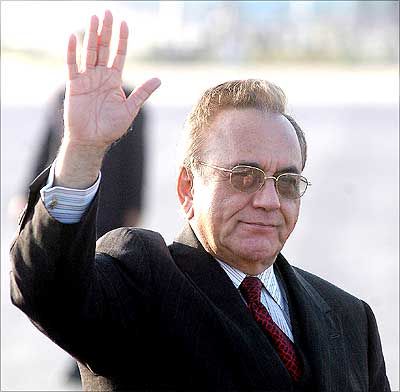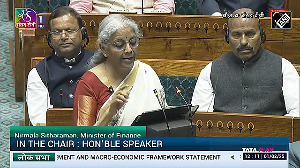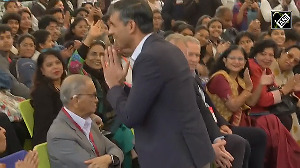 Interrelations of India, Pakistan and Afghanistan on Thursday took centre stage at the Jaipur LitFest where panelists discussed the upswing in talks between Pakistan and Afghanistan besides India's ties with its neighbour.
Interrelations of India, Pakistan and Afghanistan on Thursday took centre stage at the Jaipur LitFest where panelists discussed the upswing in talks between Pakistan and Afghanistan besides India's ties with its neighbour.
Former Pakistani foreign minister Khurshid Kasuri expressed the need for a "high degree of optimism" in dealing with relations between India and Pakistan, while former Indian diplomat G Parthasarathy called for "a halt in border firing" to ensure the continuation of meaningful dialogues.
"You can not have a dialogue when bullets are flying. Nobody hears the sound of the dialogue everyone hears the sound of the bullet," Parthsarthi said.
Kasuri and Parthasarathy were participating in a session titled "Descent into Chaos-Pakistan on the Brink" at the festival.
Ahmed Rashid, an expert on foreign policy who has authored several books about Afghanistan, Pakistan and Central Asia, pointed out that both of India's neighbours had been through a crisis in recent times.
Commenting on the recent elections in Afghanistan, which took place in the midst of a massive Taliban offensive, Rashid said, "Relations between Pakistan and Afghanistan have dramatically improved and chances are there that Afghanistan may enter into dialogue with the Afghan Taliban."
"It can happen only if Pakistani military push for it because most of the Taliban leadership live in Pakistan. Pakistani military has to push Taliban into the dialogue," Rashid said.
He pointed out that the Peshawar attack, which left nearly 150 school children dead last month served as "a horrible warning" galvanising political parties, government and military to come together on a common platform against extremism.
"They have established a long term plan which not just deals with military aspects of terrorism but also with education, jobs, madarsa and other such things," he said.
Former foreign minister of Pakistan, who had been involved for a long time in the peace process between India and Pakistan, insisted that huge optimism was required to deal with bilateral relations.
"Unless you have huge doses of optimism, you will not be able to proceed further on India-Pakistan relations," he said.
Making a reference to a book by former PM Manmohan Singh's then media adviser Sanjaya Baru "The Accidental Prime Minister" he said that Baru's book was supportive to his upcoming book "Neither a Hawk, nor a Dove," an account of Pakistan's foreign policy, particularly the peace process with India.
"I have read (the book of) Sanjaya Baru that supports what I have written in my book. What Baru has written is cent percent supports what I have written… not only on Kashmir but also in Siachen," Kasuri said.
"I have given entire framework. I have written an entire chapter on Pak Army as I see it. I am not an expert on Pak military like others but whatever I have written is completely authenticated," he said.
Summed up his thoughts on Indo-Pak relations, Kasuri said former Indian prime minister "I K Gujral Saheb and I planted a sapling which I hope will be a tree now growing faster than the Indo-Pak relations."
Meanwhile Anatol Lieven, professor at GeorgetownUniversity's School of Foreign Service based in Doha and Qatar commented that the loathing of Afghan Taliban for Pakistan made the process of dialogue difficult but still crucial.
He said he believed that the ongoing talks were capable of producing a change of heart in the Pakistani ranks.










 © 2025
© 2025